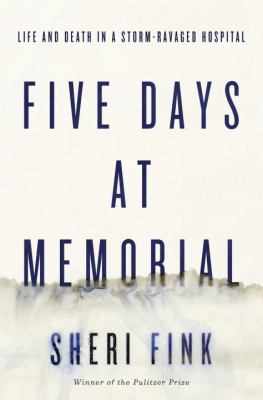
by Sheri Fink
Book list *Starred Review* As the floodwaters rose after Hurricane Katrina, patients, staff, and families who sheltered in New Orleans' Memorial Hospital faced a crisis far worse than the storm itself. Without power, an evacuation plan, or strong leadership, caregiving became chaotic, and exhausted doctors and nurses found it difficult to make even the simplest decisions. And, when it came to making the hardest decisions, some of them seem to have failed. A number of the patients deemed least likely to survive were injected with lethal combinations of drugs even as the evacuation finally began in earnest. Fink, a Pulitzer Prize winner for her reporting on Memorial in the New York Times Magazine, offers a stunning re-creation of the storm, its aftermath, and the investigation that followed (one doctor and two nurses were charged with second-degree murder but acquitted by a grand jury). She evenhandedly compels readers to consider larger questions, not just of ethics but race, resources, history, and what constitutes the greater good, while humanizing the countless smaller tragedies that make up the whole. And, crucially, she provides context, relating how other hospitals fared in similar situations. Both a breathtaking read and an essential book for understanding how people behave in times of crisis.--Graff, Keir Copyright 2010 Booklist From Booklist, Copyright © American Library Association. Used with permission. Publishers Weekly "They were in a war zone," Fink (War Hospital: A True Story of Surgery and Survival) writes of those stranded inside New Orleans' Memorial Medical Center in the calamitous wake of Hurricane Katrina. In this astonishing blend of Pulitzer Prize-winning journalism (Fink, who also has an M.D. and Ph.D., won the award for the investigative reporting on which this book is based) and breathtaking narration, she chronicles the chaotic evacuation of the hospital and the agonizing ethical, physical, and emotional quandaries facing Memorial nurses and doctors, including a nightmarish triage process that led to the controversial decision to inject critically ill patients with fatal doses of morphine in order to refocus attention on those with a chance of surviving. An alarming 45 bodies were recovered from the crippled hospital, nine of which were deemed suspected victims of euthanasia. Yet investigators realized that unraveling the tragedies was "as impossible as collecting fragments of a fractured mirror and then, somehow, inferring what image had once appeared there." Some members of the medical staff were charged with murder, but a grand jury acquitted them. Plenty of hard-earned lessons were learned from the stunningly mismanaged response to the disaster, yet Fink acknowledges that for the families of those who never made it out of Memorial, the "war against nature" could only be considered a loss. (Sept. 10) (c) Copyright PWxyz, LLC. All rights reserved. (c) Copyright PWxyz, LLC. All rights reserved Library Journal Journalist Fink (War Hospital: A True Story of Surgery and Survival) won the 2010 Pulitzer Prize for Investigative Reporting for her work on the harrowing events at New Orleans's Memorial Hospital during and after Hurricane Katrina, reporting that became the basis for this book. Two thousand patients, staff members, and their family and friends sought safety at Memorial as Katrina approached on Monday, August 28, 2005. Without power, running water, air-conditioning, or standard high-tech medical equipment, conditions quickly deteriorated, particularly for the oldest and most critically ill patients. It wasn't until Friday, September 1, that everyone was finally rescued, and, by that time, there had been 45 patient deaths-18 of them deemed suspicious by the New Orleans coroner. A legal hurricane followed, and one doctor and three nurses were accused of second-degree murder. Fink devotes half of her book to the criminal investigations and ensuing grand jury inquiry, guiding readers through the concepts of triage, euthanasia, and end-of-life care that made the cases so controversial. VERDICT Fink's six years of research and more than 500 interviews yield a rich narrative full of complex characters, wrenching ethical dilemmas, and mounting suspense. General readers and medical professionals alike will finish the book haunted by the question, "What would I have done?" [See Prepub Alert, 6/24/13.]-Kathleen Arsenault, St. Petersburg, FL (c) Copyright 2013. Library Journals LLC, a wholly owned subsidiary of Media Source, Inc. No redistribution permitted. (c) Copyright Library Journals LLC, a wholly owned subsidiary of Media Source, Inc. No redistribution permitted. |